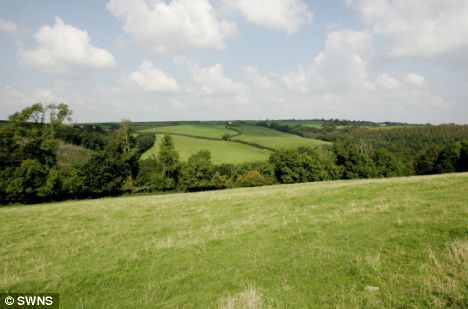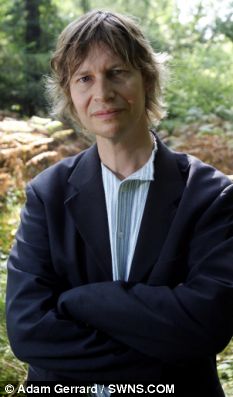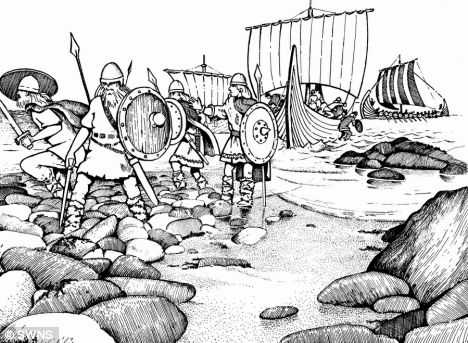Nick Arnold, the famous British author of the Horrible Science books, says he has discovered the site of one of the most important battles of British history - the Battle of Cynwit.
This battle was fought in 878 - 1130 years ago - between the English and the invading Vikings. The Vikings had already overrun most of what is now England except the south west and the battle has been dubbed "the first Battle of Britain."
Alfred the Great was King of Wessex (one of the several Anglo-Saxon kingdoms that later unified, thanks to Athelstan, to form England) at the time and in hiding. He was taking refuge in a peasant woman's cottage. She told him to look after her cakes she was baking - but he famously burnt them. The Vikings trapped the last remaining English army in a fortress named Cynuit. However, the English army - led by Ealdorman Odda - were victorious.
It was lucky that the English won. Had the Vikings won, England would have become a Danish state. Therefore, there would have been no English language. There would also have been no British Empire - and therefore there would be no United States or Canada today.
I've discovered the site of the first Battle of Britain, says writer
By Daily Mail Reporter
19th September 2008
Daily Mail
A best-selling author claims to have located the site of one the most important conflicts in Britain.
Nick Arnold, author of the Horrible Science series, believes the Battle of Cynwit, a bloody clash which saved England from the Vikings in 878, took place at Castle Hill near Beaford, Devon.
Before the clash, dubbed the 'first battle of Britain', the Viking armies had overrun the country except for Devon and Cornwall.

The 'battlefield' which Nick Arnold claims was the site where Britain rallied and charged at the invading Vikings, banishing them from the country forever
King Alfred was in hiding, when he burned the cakes of a peasant woman.
The last of the Saxon soldiers took refuge in a fortress named Cynwit or Cynuit, and overcame the Viking forces to banish them.
Mr Arnold says he located the remains of the fort and the battlefield using accounts given at the time.

Nick Arnold at his newly discovered site
He said: 'What we've got is a fort that exactly matches the description given by Bishop Asser in a location that precisely fits the account of the battle.
'What's more the perimeter was shortened to fit a unit of measurement used by the Saxons when they planned forts.
'Nearby is the settlement of Kingscott - with a name that can be linked to Cynuit.
'The most amazing moment was when I realised that the perimeter of the fort had been altered to precisely match Saxon measurements.'
Nick, who has sold ten million books, says he has had a lifelong interest in the Vikings after being told stories about them by his grandfather.
In between writing his best selling series he has dedicated himself to locating the site of the battle of Cynuit which he says he has now found.
The battle took place when King Alfred is said to have taken refuge in the home of a peasant who asked him to look after her cakes which, he famously burned.
Nick said he is convinced his site is correct because it 'exactly' matches contemporary accounts - and the borders and walls can also still be traced.
Most of the walls of the fortress have been removed but can be traced in a number of places and traces of the ditch also survive.
He said: 'The story goes back to 878. The Vikings had overrun the whole of England except for Devon and Cornwall and King Alfred was in hiding burning cakes.
'According to Bishop Asser, an army of Vikings landed in Devon. The Vikings trapped the last remaining Saxon army in a fortress named Cynuit.
'All seemed lost but in a moment of divine inspiration the Saxons charged from the fortress and wiped out the Viking army.
'If the Vikings had won, King Alfred would have been dead in weeks. There would have been no fight-back and England would have become a Danish state.
'There would have been no English language, no British Empire and no United States.'

An artist's impression of the Vikings arriving by ship at the 'first battle of Britain'
Nick's interest began in childhood when his grandfather told him stories of King Hubba who was killed in a battle at Bloody Corner in Northam, Devon.
He said: 'When I grew up I found out that there was a real Viking called Ubbi Ragnarsson who was killed in a real battle in a fortress named Cynuit in 878.
'I began to wonder where the real battlefield was. As I read more about the battle I realised that it was an incredibly dramatic and important event.
'Despite its importance the site has been lost for one thousand years. I thought it might be easy to find. It's known to be in Devon and there is a contemporary description of the fortress.'
Despite its historical importance Nick says he accidentally found the site - after his wife pointed it out on a drive through the countryside.
He said: 'We were driving past the site and my wife saw the sign to Kenwith Nursery. Kenwith is a name sometimes used for the battle.
'The fact that the nursery is there is nothing to do with the battle but in an idle moment. I looked it up on the map and the geography appeared to match the battlefield.'
He has discussed his work with two historians and an archaeologist and plans to send a report to some of the professional historians who specialise in that period.
Nick said: 'There's no formal body that recognises historical discoveries - normally they get published in a learned journal but this isn't vital.
'I expect a lively debate among historians. However, the fact is that the evidence I will be presenting is far, far stronger than for any other site.
'For this reason, although it may take time, the history books will have to be rewritten.'
Nick is Britain's best-selling children's science writer and his books are published in 38 languages.
His Horrible Science collection has sold over five million copies in the UK and an estimated ten million more worldwide.
Nick's publishers, Scholastic UK, are interested in his findings and are considering working them into a new children's book.
dailymail.co.uk
This battle was fought in 878 - 1130 years ago - between the English and the invading Vikings. The Vikings had already overrun most of what is now England except the south west and the battle has been dubbed "the first Battle of Britain."
Alfred the Great was King of Wessex (one of the several Anglo-Saxon kingdoms that later unified, thanks to Athelstan, to form England) at the time and in hiding. He was taking refuge in a peasant woman's cottage. She told him to look after her cakes she was baking - but he famously burnt them. The Vikings trapped the last remaining English army in a fortress named Cynuit. However, the English army - led by Ealdorman Odda - were victorious.
It was lucky that the English won. Had the Vikings won, England would have become a Danish state. Therefore, there would have been no English language. There would also have been no British Empire - and therefore there would be no United States or Canada today.
I've discovered the site of the first Battle of Britain, says writer
By Daily Mail Reporter
19th September 2008
Daily Mail
A best-selling author claims to have located the site of one the most important conflicts in Britain.
Nick Arnold, author of the Horrible Science series, believes the Battle of Cynwit, a bloody clash which saved England from the Vikings in 878, took place at Castle Hill near Beaford, Devon.
Before the clash, dubbed the 'first battle of Britain', the Viking armies had overrun the country except for Devon and Cornwall.

The 'battlefield' which Nick Arnold claims was the site where Britain rallied and charged at the invading Vikings, banishing them from the country forever
King Alfred was in hiding, when he burned the cakes of a peasant woman.
The last of the Saxon soldiers took refuge in a fortress named Cynwit or Cynuit, and overcame the Viking forces to banish them.
Mr Arnold says he located the remains of the fort and the battlefield using accounts given at the time.

Nick Arnold at his newly discovered site
He said: 'What we've got is a fort that exactly matches the description given by Bishop Asser in a location that precisely fits the account of the battle.
'What's more the perimeter was shortened to fit a unit of measurement used by the Saxons when they planned forts.
'Nearby is the settlement of Kingscott - with a name that can be linked to Cynuit.
'The most amazing moment was when I realised that the perimeter of the fort had been altered to precisely match Saxon measurements.'
Nick, who has sold ten million books, says he has had a lifelong interest in the Vikings after being told stories about them by his grandfather.
In between writing his best selling series he has dedicated himself to locating the site of the battle of Cynuit which he says he has now found.
The battle took place when King Alfred is said to have taken refuge in the home of a peasant who asked him to look after her cakes which, he famously burned.
Nick said he is convinced his site is correct because it 'exactly' matches contemporary accounts - and the borders and walls can also still be traced.
Most of the walls of the fortress have been removed but can be traced in a number of places and traces of the ditch also survive.
He said: 'The story goes back to 878. The Vikings had overrun the whole of England except for Devon and Cornwall and King Alfred was in hiding burning cakes.
'According to Bishop Asser, an army of Vikings landed in Devon. The Vikings trapped the last remaining Saxon army in a fortress named Cynuit.
'All seemed lost but in a moment of divine inspiration the Saxons charged from the fortress and wiped out the Viking army.
'If the Vikings had won, King Alfred would have been dead in weeks. There would have been no fight-back and England would have become a Danish state.
'There would have been no English language, no British Empire and no United States.'

An artist's impression of the Vikings arriving by ship at the 'first battle of Britain'
Nick's interest began in childhood when his grandfather told him stories of King Hubba who was killed in a battle at Bloody Corner in Northam, Devon.
He said: 'When I grew up I found out that there was a real Viking called Ubbi Ragnarsson who was killed in a real battle in a fortress named Cynuit in 878.
'I began to wonder where the real battlefield was. As I read more about the battle I realised that it was an incredibly dramatic and important event.
'Despite its importance the site has been lost for one thousand years. I thought it might be easy to find. It's known to be in Devon and there is a contemporary description of the fortress.'
Despite its historical importance Nick says he accidentally found the site - after his wife pointed it out on a drive through the countryside.
He said: 'We were driving past the site and my wife saw the sign to Kenwith Nursery. Kenwith is a name sometimes used for the battle.
'The fact that the nursery is there is nothing to do with the battle but in an idle moment. I looked it up on the map and the geography appeared to match the battlefield.'
He has discussed his work with two historians and an archaeologist and plans to send a report to some of the professional historians who specialise in that period.
Nick said: 'There's no formal body that recognises historical discoveries - normally they get published in a learned journal but this isn't vital.
'I expect a lively debate among historians. However, the fact is that the evidence I will be presenting is far, far stronger than for any other site.
'For this reason, although it may take time, the history books will have to be rewritten.'
Nick is Britain's best-selling children's science writer and his books are published in 38 languages.
His Horrible Science collection has sold over five million copies in the UK and an estimated ten million more worldwide.
Nick's publishers, Scholastic UK, are interested in his findings and are considering working them into a new children's book.
dailymail.co.uk